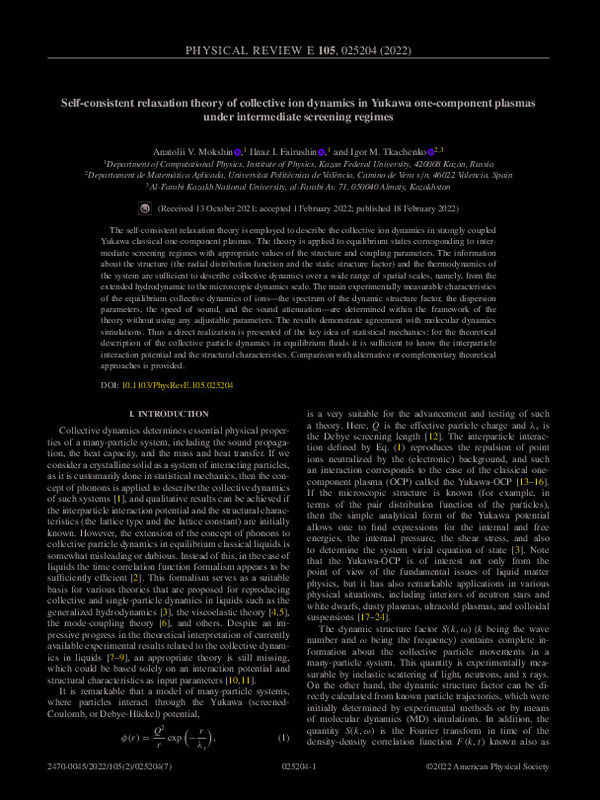JavaScript is disabled for your browser. Some features of this site may not work without it.
Buscar en RiuNet
Listar
Mi cuenta
Estadísticas
Ayuda RiuNet
Admin. UPV
Self-consistent relaxation theory of collective ion dynamics in Yukawa one-component plasmas under intermediate screening regimes
Mostrar el registro sencillo del ítem
Ficheros en el ítem
| dc.contributor.author | Mokshin, Anatolii V.
|
es_ES |
| dc.contributor.author | Fairushin, Ilnaz I.
|
es_ES |
| dc.contributor.author | Tkachenko Gorski, Igor Mijail
|
es_ES |
| dc.date.accessioned | 2022-11-28T19:01:39Z | |
| dc.date.available | 2022-11-28T19:01:39Z | |
| dc.date.issued | 2022-02-18 | es_ES |
| dc.identifier.issn | 1539-3755 | es_ES |
| dc.identifier.uri | http://hdl.handle.net/10251/190268 | |
| dc.description.abstract | [EN] The self-consistent relaxation theory is employed to describe the collective ion dynamics in strongly coupled Yukawa classical one-component plasmas. The theory is applied to equilibrium states corresponding to intermediate screening regimes with appropriate values of the structure and coupling parameters. The information about the structure (the radial distribution function and the static structure factor) and the thermodynamics of the system are sufficient to describe collective dynamics over a wide range of spatial scales, namely, from the extended hydrodynamic to the microscopic dynamics scale. The main experimentally measurable characteristics of the equilibrium collective dynamics of ions-the spectrum of the dynamic structure factor, the dispersion parameters, the speed of sound, and the sound attenuation-are determined within the framework of the theory without using any adjustable parameters. The results demonstrate agreement with molecular dynamics simulations. Thus a direct realization is presented of the key idea of statistical mechanics: for the theoretical description of the collective particle dynamics in equilibrium fluids it is sufficient to know the interparticle interaction potential and the structural characteristics. Comparison with alternative or complementary theoretical approaches is provided. | es_ES |
| dc.description.sponsorship | This work was supported by the Russian Science Foundation (Project No. 19-12-00022). I.M.T. acknowledges the financial support provided by the Committee of Science of the Ministry of Education and Science of the Republic of Kazakhstan (Project No. AP09260349). A.V.M. acknowledges the Theoretical Physics and Mathematics Advancement Foundation ¿BASIS¿ (Project No. 20-1-2-38-1) for supporting the computational part of this work. The authors are grateful to R. M. Khusnutdinoff and B. N. Galimzyanov for discussion of the results of molecular dynamics simulations. | es_ES |
| dc.language | Inglés | es_ES |
| dc.publisher | American Physical Society | es_ES |
| dc.relation.ispartof | Physical review. E, Statistical, nonlinear, and soft matter physics | es_ES |
| dc.rights | Reserva de todos los derechos | es_ES |
| dc.subject.classification | MATEMATICA APLICADA | es_ES |
| dc.title | Self-consistent relaxation theory of collective ion dynamics in Yukawa one-component plasmas under intermediate screening regimes | es_ES |
| dc.type | Artículo | es_ES |
| dc.identifier.doi | 10.1103/PhysRevE.105.025204 | es_ES |
| dc.relation.projectID | info:eu-repo/grantAgreement/RSF//19-12-00022/ | es_ES |
| dc.relation.projectID | info:eu-repo/grantAgreement/Ministry of Education and Science, República de Kazajistán//AP09260349/ | es_ES |
| dc.rights.accessRights | Abierto | es_ES |
| dc.contributor.affiliation | Universitat Politècnica de València. Escuela Técnica Superior de Ingenieros Industriales - Escola Tècnica Superior d'Enginyers Industrials | es_ES |
| dc.description.bibliographicCitation | Mokshin, AV.; Fairushin, II.; Tkachenko Gorski, IM. (2022). Self-consistent relaxation theory of collective ion dynamics in Yukawa one-component plasmas under intermediate screening regimes. Physical review. E, Statistical, nonlinear, and soft matter physics. 105(2):1-7. https://doi.org/10.1103/PhysRevE.105.025204 | es_ES |
| dc.description.accrualMethod | S | es_ES |
| dc.relation.publisherversion | https://doi.org/10.1103/PhysRevE.105.025204 | es_ES |
| dc.description.upvformatpinicio | 1 | es_ES |
| dc.description.upvformatpfin | 7 | es_ES |
| dc.type.version | info:eu-repo/semantics/publishedVersion | es_ES |
| dc.description.volume | 105 | es_ES |
| dc.description.issue | 2 | es_ES |
| dc.identifier.pmid | 35291083 | es_ES |
| dc.relation.pasarela | S\458131 | es_ES |
| dc.contributor.funder | Russian Science Foundation | es_ES |
| dc.contributor.funder | Ministry of Education and Science, República de Kazajistán | es_ES |








